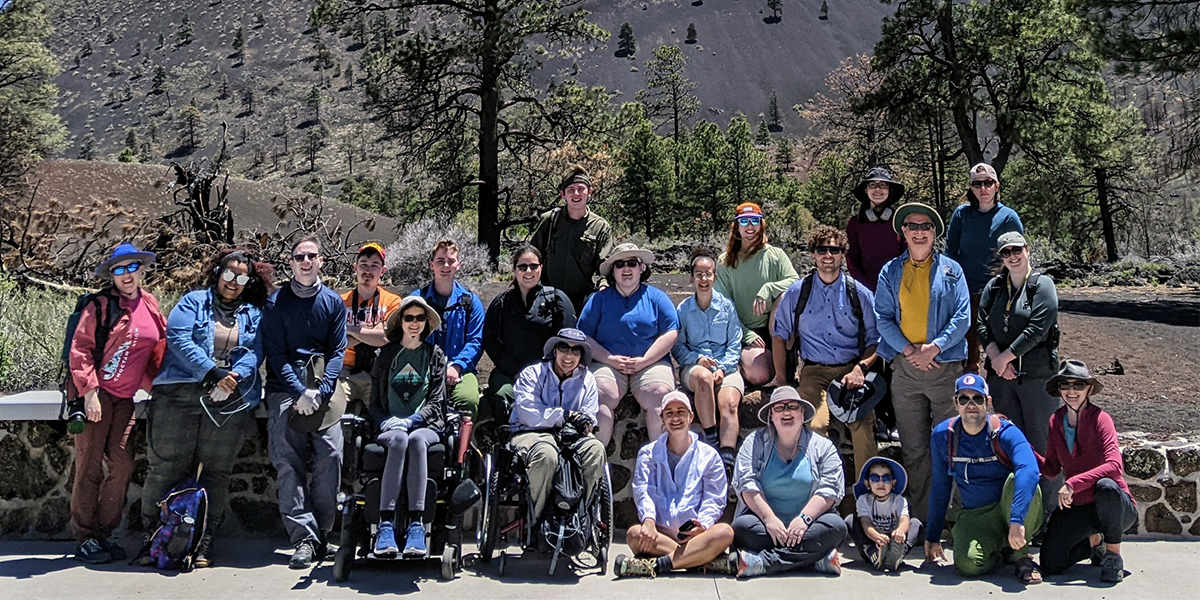Anita M.S. Marshall (UF Department of Geological Sciences)
October 3, 2024
Ustler Hall Atrium
5:30 PM
Experiencing the natural world outside of the classroom provides essential, formative experiences to those working in natural science disciplines. But these opportunities can present social and environmental barriers that make them inaccessible to many students. GeoSPACE is a unique program at UF that challenges traditional ideas about who belongs in the field and how we interact with the landscape, with the aim of cultivating a more accessible, inclusive, and ethical approach to field science.
Created by and for geoscientists from traditionally underrepresented and marginalized groups, this National Science Foundation supported field course and mentoring program offers a scientifically rigorous, uplifting space for students with disabilities, women, and those of gender-nonconforming identity, and to people of all racial, ethnic, geographic, and socioeconomic backgrounds who may be thought to not “belong” in conventional fieldwork, helping them to build skills and find community in collective scientific practice.
In her lecture Dr. Marshall, a member of the Choctaw Nation of Oklahoma who is herself a disabled geoscientist, will explore the philosophies and frameworks behind GeoSPACE and provide an opportunity to reflect on broader themes of inclusion, access, and community in science and beyond.
This event is free and open to the public.
About the Speaker
 Dr. Anita M.S. Marshall is Senior Lecturer in the Department of Geological Sciences, University of Florida, and the Executive Director of the International Association for Geoscience Diversity (theIAGD.org), a non-profit with the mission to improve inclusion in the geoscience for people with disabilities. Her primary research areas are geoscience education, centered on the experiences of people with disabilities and other underserved groups in science disciplines, experiential learning (especially in field settings), and the culture of the geosciences. Her teaching and research incorporate qualitative and quantitative methods grounded in disability justice frameworks, geo-ethics, and Indigenous relationality principles, to develop novel approaches for creating accessible, inclusive educational and professional spaces. Her work is informed by her own experiences as a disabled geoscientist, a member of the Choctaw Nation of Oklahoma, and her non-traditional academic path. Her geologic training is in volcanology, using near-surface geophysics to examine tephra deposits and subsurface features of small-volume volcanic eruptions.
Dr. Anita M.S. Marshall is Senior Lecturer in the Department of Geological Sciences, University of Florida, and the Executive Director of the International Association for Geoscience Diversity (theIAGD.org), a non-profit with the mission to improve inclusion in the geoscience for people with disabilities. Her primary research areas are geoscience education, centered on the experiences of people with disabilities and other underserved groups in science disciplines, experiential learning (especially in field settings), and the culture of the geosciences. Her teaching and research incorporate qualitative and quantitative methods grounded in disability justice frameworks, geo-ethics, and Indigenous relationality principles, to develop novel approaches for creating accessible, inclusive educational and professional spaces. Her work is informed by her own experiences as a disabled geoscientist, a member of the Choctaw Nation of Oklahoma, and her non-traditional academic path. Her geologic training is in volcanology, using near-surface geophysics to examine tephra deposits and subsurface features of small-volume volcanic eruptions.
“The Rocks Don’t Care How You Got There” is sponsored by Imagining Climate Change and the Center for Gender, Sexualities, and Women’s Studies Research.
